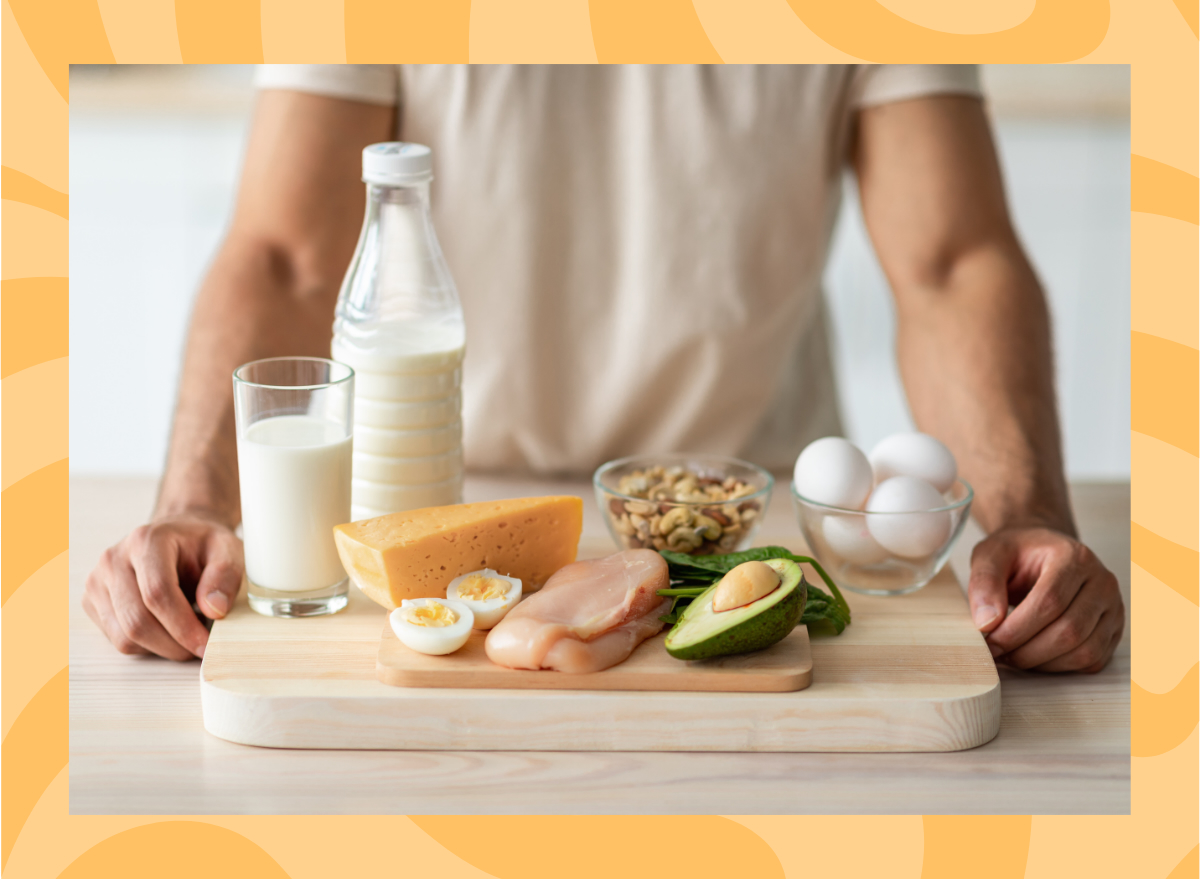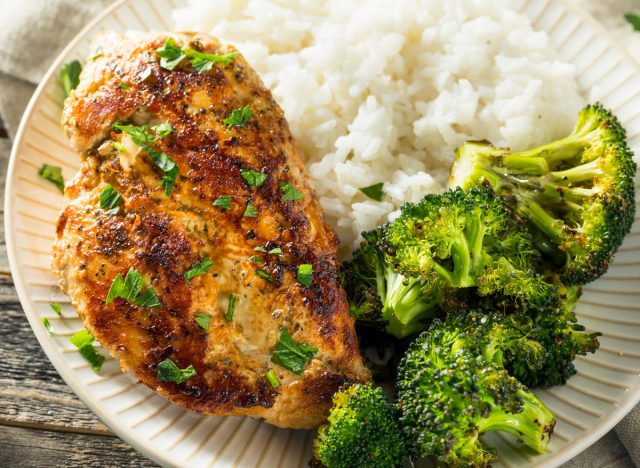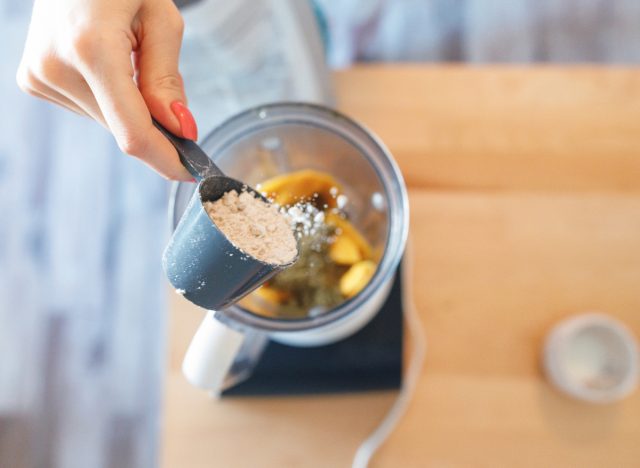Here’s How Much Protein You Should Actually Eat in One Meal

Protein is one of the four macronutrients you need every day to keep you full, support muscle growth, and maintain overall health. But while your daily protein needs can vary depending on factors like your activity level and age, knowing how much to eat in one sitting is essential to avoid overloading your body and putting yourself at risk for health issues.
To find out the ideal amount of protein per meal, we spoke with registered dietitian Gabrielle Tafur, RD, and Preventive Medicine Doctor Cedrina Calder, MD. They explain exactly how much protein you should eat per meal so that you can avoid overdoing it.
So, can you eat too much protein, and how much protein is too much for one meal? Here’s what the experts had to say. Read on, and for more, be sure to check out 15 Best High-Protein Foods for Weight Loss.
How Much Protein Is Too Much in One Meal?

Both Tafur and Dr. Calder agree that it’s best to limit protein intake to 30 grams per meal. “Excess protein consumption in roughly amounts greater than 30 grams per hour are not stored,” says Tafur, so consuming more than that generally will not offer additional benefits and can even strain your kidneys.
Unlike carbs or fats, which your body can store for energy, protein doesn’t have the same storage system. Have you ever heard of someone carbo-loading before a big race? The body breaks down carbohydrates into glucose, which is then stored as glycogen in the muscles and liver. So when you’re engaging in intense physical activity, your body utilizes these glycogen stores so that you are able to withstand fatigue and finish the workout.
Protein works differently. Eating protein will not yield immediate energy like fat and carbs will, so the body redirects metabolic processes in order to create energy. The kidneys will then remove any excess protein in the blood and then excrete it though urine. If excess protein is consumed regularly, the kidneys may become stressed. Calder says those with kidney disease may fare better avoiding eating a high-protein diet. “Protein is never stored, and it is never meant to be used for immediate energy,” Tafur explains.
However, research suggests that while the body can’t store protein, it doesn’t mean that eating more than 20-25 grams per meal is always wasteful. Some of the extra protein can still support muscle growth, particularly when it’s from slower-digesting sources like whole foods and consumed alongside other nutrients.
For those looking to maximize muscle growth, a practical guideline is to aim for roughly 20-40 grams of protein per meal, spread across four servings a day. Higher intakes may be beneficial for some people, but individual needs can vary depending on goals and activity levels.
Can You Eat Too Much Protein? Here Are The Risks
While protein is essential for building muscle and keeping you full, consuming too much can lead to problems. Here are a few risks to be aware of if you eat too much protein.
- Kidney Strain: While carbs can be stored as glycogen for quick energy during intense activity, protein doesn’t work the same way. Regularly consuming excess protein can put undue strain on your kidneys, making it inefficient and potentially harmful in the long run. “When we consume protein in excess, this adds more work for the kidneys to filter this through the body in order for protein to not build up within the protein,” says Tafur.
- Weight Gain: Eating more protein than your body needs can also lead to weight gain. “The human body will store any excess calories as fat,” says Calder. “In other words, if eating a high-protein diet increases your daily caloric intake to the point where it is higher than the daily caloric output, you will gain fat as a result.”
- Digestive Issues: Consuming excessive protein, especially from certain sources like red meat, can lead to digestive issues such as constipation or bloating.
Keeping your protein intake balanced and within recommended limits helps you avoid these potential risks while still reaping the benefits.
How Much Protein Should You Eat Daily?

To put “too much protein” into context, it’s important to know what the suggested baseline protein intake is.
The Dietary Reference Intake (DRI) suggests consuming 0.8 grams of protein per kilogram of body weight (roughly 0.36 grams per pound). If your goal is to build muscle, that amount can increase to around 1.5 grams per kilogram of body weight, combined with a balanced diet.
Based on this calculation, an example of how much protein should eat a day is that they would need a minimum of 50 grams of protein daily, increasing to around 95 grams if they’re focused on building muscle.
Protein needs can also be higher for older adults, those recovering from illness, and people with high activity levels. Ultimately, the amount of protein you need each day varies from person to person and depends on several factors.
Best Sources of Protein

Both Calder and Tafur agree the best protein comes from whole foods. Some examples of healthy protein sources include:
- Lean meat
- Fish
- Nuts and nut butters
- Seeds
- Non-processed soy products
- Protein powder
High-quality protein powders are a good way to supplement protein into your diet. What is the best protein powder? One that’s plant-based and contains minimal preservatives and sweeteners. Plant-based protein powders can typically provide up to 20 grams of protein per serving. Blend one scoop of protein powder with oat milk, berries, and a handful of spinach for a vitamin-packed, protein-rich smoothie.
“The use of protein powders is an effective way to help supplement your diet to ensure that you are meeting your daily intake targets,” says Calder. “However, you should aim to get the majority of your daily protein from whole food sources.”
Key Takeaways: There Is Such Thing as “Too Much Protein”
Consuming more than 30 grams of protein is too much for just one meal because your kidneys will process and excrete any excess. In other words, you could be throwing your hard-earned cash down the toilet if you’re trying to ingest more than that within one hour because protein cannot be stored in the body for later use.
Spacing out your protein intake across meals is the best way to ensure your body makes full use of what you consume. For example, instead of pairing a protein shake with a large dinner, save it for after your workout or enjoy it as a mid-day snack. By managing your intake throughout the day, you can avoid the pitfalls of eating too much protein while still meeting your health and fitness goals.